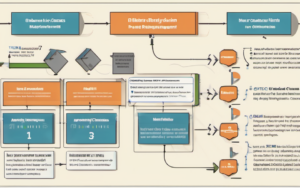Blockchain technology is revolutionizing the financial landscape, disrupting traditional systems and paving the way for a new era of decentralized finance. This innovative technology offers numerous benefits, including increased efficiency, reduced costs, and enhanced security, making it a game-changer for financial institutions and individuals alike.
Blockchain: A Revolutionary Force in Finance
What is Blockchain?
Blockchain is a distributed, immutable ledger that records transactions in a secure and transparent manner. Imagine a digital spreadsheet shared across a vast network of computers, where each entry is cryptographically linked to the previous one, creating an unbreakable chain of information. This decentralized nature eliminates the need for a central authority, fostering trust and transparency in transactions.
Key Features of Blockchain
Decentralization
Blockchain operates without a central authority, making it resistant to censorship and manipulation. This decentralization empowers users and fosters a more equitable financial system.
Transparency
Every transaction on a blockchain is publicly visible, promoting accountability and trust among participants. This transparency fosters a more open and transparent financial environment.
Security
Blockchain utilizes cryptography to secure transactions and prevent tampering. This robust security framework makes it extremely difficult for hackers to compromise the system.
Immutability
Once a transaction is recorded on the blockchain, it is permanently stored and cannot be altered, ensuring the integrity of the data. This immutability provides a reliable and auditable record of transactions.
Blockchain’s Impact on Traditional Finance
Blockchain technology is disrupting traditional finance by challenging established institutions and processes. Its ability to streamline transactions, enhance security, and reduce costs is transforming the financial landscape.
Disrupting Traditional Financial Systems
Decentralized Finance (DeFi)
DeFi is a rapidly growing movement that aims to build a decentralized financial ecosystem on top of blockchain technology. This includes various applications, such as:
Lending and Borrowing
DeFi platforms enable users to lend and borrow cryptocurrencies without the need for traditional intermediaries like banks. This provides greater access to financial services and potentially higher interest rates for lenders.
Trading and Exchanges
Decentralized exchanges (DEXs) allow users to trade cryptocurrencies directly with each other without relying on centralized platforms. This fosters greater autonomy and potentially lower trading fees.
Stablecoins
Stablecoins are cryptocurrencies designed to maintain a stable value, often pegged to a fiat currency like the US dollar. They offer stability and reduce volatility in DeFi applications.
Tokenization of Assets
Blockchain allows for the tokenization of various assets, transforming them into digital representations on a blockchain. This has significant implications for various industries:
Securities Tokenization
Securities, such as stocks and bonds, can be tokenized on a blockchain, making them easier to trade and manage. This can improve liquidity and reduce costs associated with traditional securities markets.
Real Estate Tokenization
Real estate properties can be tokenized, enabling fractional ownership and easier trading. This can open up real estate investment opportunities to a wider range of investors.
Commodities Tokenization
Commodities like oil, gold, and agricultural products can be tokenized, facilitating efficient trading and global access. This can streamline commodity markets and increase transparency.
Payment Systems and Remittances
Blockchain technology is revolutionizing payment systems and remittances by offering faster, cheaper, and more secure alternatives to traditional methods.
Faster and Cheaper Transactions
Blockchain transactions can be processed much faster than traditional payment systems, often within seconds. This reduces delays and saves time and money.
Cross-Border Payments
Blockchain facilitates seamless cross-border payments, eliminating the need for intermediaries and reducing associated fees. This can significantly reduce costs and improve efficiency for international transactions.
Benefits and Challenges of Blockchain in Finance
Benefits
Increased Efficiency
Blockchain streamlines processes, reduces paperwork, and automates transactions, resulting in significant efficiency gains across the financial sector.
Reduced Costs
Blockchain eliminates the need for intermediaries, reducing transaction fees and other associated costs. This can benefit both businesses and consumers.
Enhanced Security
Blockchain’s robust security measures protect against fraud, hacking, and data breaches, enhancing the security of financial transactions.
Financial Inclusion
Blockchain technology can provide financial services to underserved populations by removing barriers to access and facilitating financial inclusion.
Challenges
Scalability
Scaling blockchain networks to handle a large volume of transactions can be challenging, potentially limiting their adoption for mainstream financial applications.
Regulation
The regulatory landscape surrounding blockchain technology is still evolving, creating uncertainty for businesses and hindering its widespread adoption.
Security Concerns
While blockchain is generally secure, there are still potential security risks, such as smart contract vulnerabilities and the possibility of hacks.
The Future of Blockchain in Finance
Emerging Trends
Central Bank Digital Currencies (CBDCs)
Central banks around the world are exploring the potential of issuing digital currencies based on blockchain technology. This could revolutionize monetary policy and financial systems.
Non-Fungible Tokens (NFTs)
NFTs are unique digital assets that can represent ownership of digital or physical assets. They are gaining popularity in finance for applications like fractional ownership, asset management, and tokenized securities.
Decentralized Autonomous Organizations (DAOs)
DAOs are blockchain-based organizations that operate autonomously through smart contracts. They offer new possibilities for financial governance and decision-making.
Predictions and Outlook
Increased Adoption
Blockchain adoption is expected to continue growing in the financial sector, with more institutions embracing its benefits and developing new applications.
Integration with Traditional Systems
Blockchain technology is likely to be integrated with traditional financial systems, leading to a hybrid model that combines the best of both worlds.
Innovation and Development
The blockchain landscape is constantly evolving, with new innovations and developments emerging regularly. This ongoing innovation will drive further disruption and growth in the finance industry.
Summary of Key Points
Blockchain technology is revolutionizing the financial landscape, disrupting traditional systems and offering numerous benefits, including increased efficiency, reduced costs, and enhanced security. Decentralized finance, tokenization of assets, and blockchain-based payment systems are transforming how we manage and transact with money. While challenges remain, the future of blockchain in finance is bright, with increasing adoption, integration with traditional systems, and ongoing innovation shaping the future of the industry.




